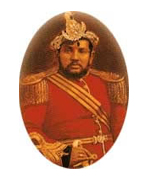Gajraj Singh Thapa
This article has multiple issues. Please help improve it or discuss these issues on the talk page. (Learn how and when to remove these messages)
|
Colonel Gajraj Singh Thapa (Nepali: गजराज सिंह थापा) was the first person to establish tea plantation estates in Nepal. Some time around 1873, Colonel Gajraj Singh Thapa, son-in-law of the famous Rana Prime Minister, Jung Bahadur Rana, was on a tour of Darjeeling.[1] He was impressed by the sight of the young tea plants and the tasty drink he was offered everywhere he went. Having a fond travel memory was not enough, so upon his return he was determined to grow the beverage in his own. The colonel soon set up two plantations - the Ilam and Soktim tea estates, 103 acres each - and so began Nepal's tea industry."[2] Colonel Thapa was then the Governor General of the eastern region of Nepal,[3] hence the Bada Hakim title. He along with his Royal Army set up these tea estates.[4]

Colonel Bada Hakim Gajraj Singh Thapa was in born c1830 to Hemdal Singh Thapa. In 1860, he married Maharajkumari Badan Kumari Rana of Kaski and Lamjung, the eldest child of Sri Teen Jung Bahadur Rana. They had one son and four daughters. The son was Colonel Harka Jung Thapa, ancestor of the Jung Thapa family. Ever since the marital relation with Jung Bahadur Rana's eldest daughter, Gajaraj Singh Thapa's descendants' middle name was replaced from 'Singh' to 'Jung'. This is said to have been done at Jung Bahadur Rana's request in an attempt to signify his own name.

Titles
- Colonel of the Nepal Army
- Governor General or Bada Hakim (बडा हाकिम) of Eastern Nepal.
References
- ^ Jane, Pettigrew; Richardson, Bruce (1 Feb 2006). The Tealover's Companion: A Guide to Teas Throughout the World. London: National Trust Enterprises Ltd. p. 142. ISBN 070780390X. Retrieved 30 September 2014.
- ^ "Nepal Origin Teas". G S Haly Company. Retrieved 23 September 2014.
- ^ Jane, Pettigrew; Richardson, Bruce (1 Feb 2006). The Tealover's Companion: A Guide to Teas Throughout the World. London: National Trust Enterprises Ltd. p. 142. ISBN 070780390X. Retrieved 30 September 2014.
- ^ "Tea Evolution in Nepal". Antu Valley Tea. Retrieved 25 September 2014.

